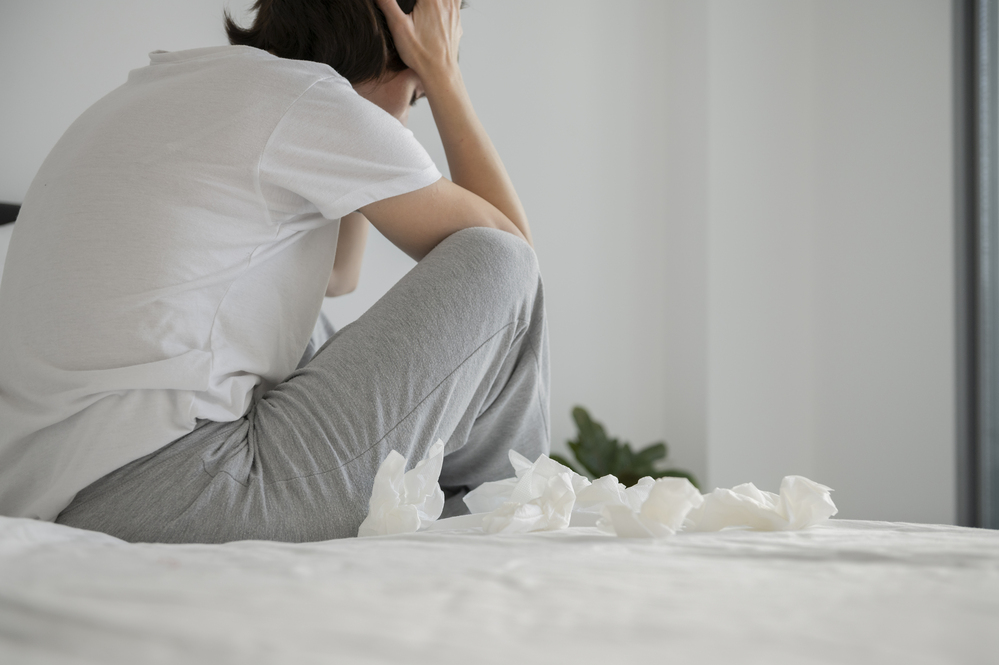The impact of complementary therapies on dysmenorrhea in young women

Downloads
HIGHLIGHTS
- Complementary treatments have been shown to greatly reduce the intensity of dysmenorrhea pain.
- The use of medicinal plants, herbal concoctions, or compresses might reduce dysmenorrhea discomfort more effectively than taking medications like mefenamic acid, ibuprofen, piroxicam, etc
ABSTRACT
Objective: The study's objective was to obtain latest data on alternative therapy for dysmenorrhea in adolescent females of reproductive age.
Materials and Methods: A scoping review was conducted using the PRISMA ScR protocol. A search was conducted on PubMed, Science Direct, and Wiley, yielding 848 studies. Ten literature studies were identified that satisfied the criteria for population, exposure, and outcome. The studies also incorporated inclusion criteria, focusing on women of reproductive age who had dysmenorrhea.
Results: Out of 848 articles, 32 were considered potentially relevant and met the inclusion criteria. The articles indicated that teenagers commonly used warm compresses and herbal drinks as supplementary therapies to alleviate dys-menorrhea due to their perceived effectiveness and comfort. Other complement-ary therapies for the condition included massage, relaxation, herbal products, self-care practices, acupuncture, and therapeutic methods.
Conclusion: Herbal and warm water compress are the most commonly applied alternative therapies for treating dysmenorrhea.
Astuti D, Kulsum U. Pola menstruasi dengan terjadinya anemia pada remaja [Menstrual pattern and anemica incidence among adolescents]. Ilmu Keperawatan dan Kebidanan. 2020;11(2):314–27. doi: 10.26751/jikk.v11i2.832.
Sembiring JB, Kadir D, Tarigan R. Efektivitas terapi kombinasi pemberian seduhan kembang telang/butterfly pea (Clittoria ternatea) dan lamaze exercice terhadap penurunan nyeri haid (dis-minore) pada remaja putri [Effectiveness of combined therapy using butterfly pea infusion and lamaze exercise on dysmenorrhea reduction]. Healthy Tadulako Journal. 2022;8(1):44–51. doi: 10.22487/htj.v8i1.487
Budhi NGMAA, Aticeh, Follona W, et al. (2022). Effect of spice drinks (red ginger and cinnamon) on dysmenorrhea pain. International Journal of Science and Society. 2022;4(4):437-48. doi: 10.54783/ijsoc.v4i4.592.
Nurbaiti, Febrina R. Pranayama sebagai pengurangan nyeri menstruasi pada remaja putri di SMK Baiturrahim [Pranayama to reduce dys-menorrhea among female adolescents in SMK Baiturrahim]. 2022;4(3):355–60. doi: 10.36565/jak. v4i3.329.
Azizah N, Kusumawardani PA. Inhalasi aromaterapi lavender dengan penurunan intensitas nyeri dismenorea pada remaja. Proceeding Book of the Health National Conference; 2020 Mar 4; Mataram, Indonesia.
Samba Conney C, Akwo Kretchy I, Asiedu-Danso M, et al. Complementary and alternative medicine use for primary dysmenorrhea among senior high school students in the western region of Ghana. Obstet Gynecol Int. 2019;2019:8059471. doi: 10.1155/2019/8059471. PMID: 31885598; PMCID: PMC6899296.
Arini KN, Nyoman N, Witari D. Edukasi pemanfaatan terapi komplementer untuk me-ngurangi kejadian emesis gravidarum pada kehamilan pertama [Education on complementary therapy for reducing emesis gravidarum in first pregnancy]. Jurnal Abdi Mahosada. 2023 ;1(1):7–13. doi: 10.54107/abdimahosada.v1i1. 145
Munn Z, Peters MDJ, Stern C, et al. Systematic review or scoping review? Guidance for authors when choosing between a systematic or scoping review approach. BMC Med Res Methodol. 2018;18(1):143. doi: 10.1186/s12874-018-0611-x. PMID: 30453902; PMCID: PMC6245623.
Tricco AC, Lillie E, Zarin W, et al. PRISMA Extension for Scoping Reviews (PRISMA-ScR): Checklist and Explanation. Ann Intern Med. 2018;169(7):467-73. doi: 10.7326/M18-0850. Epub 2018 Sep 4. PMID: 30178033.
Duman NB, Yıldırım F, Vural G. Risk factors for primary dysmenorrhea and the effect of complementary and alternative treatment methods: Sample from Corum, Turkey. Int J Health Sci (Qassim). 2022;16(3):35-43. PMID: 35599944; PMCID: PMC9092532.
Unnisa H, Annam P, Gubba NC, et al. Assessment of quality of life and effect of non-pharmacological management in dysmenorrhea. Ann Med Surg (Lond). 2022;81:104407. doi: 10.1016/j.amsu.2022. 104407. PMID: 36147090; PMCID: PMC9486665.
Wang H, Cao Y, Jin X, et al. Effect of an acupuncture technique of penetrating through zhibian (BL54) to shuidao (ST28) with long needle for pain relief in patients with primary dysmenorrhea: A randomized controlled trial. Pain Res Manag. 2019;2019:7978180. doi: 10.1155/ 2019/7978180. PMID: 31929849; PMCID: PMC6935824.
Abubakar U, Zulkarnain AI, Samri F, et al. Use of complementary and alternative therapies for the treatment of dysmenorrhea among undergraduate pharmacy students in Malaysia: a cross sectional study. BMC Complement Med Ther. 2020;20(1) :285. doi: 10.1186/s12906-020-03082-4. PMID: 32 948163; PMCID: PMC7501717.
Fernández-Martínez E, Pérez-Corrales J, Palacios-Ceña D, et al. Pain management and coping strategies for primary dysmenorrhea: A qualitative study among female nursing students. Nurs Open. 2022;9(1):637-45. doi: 10.1002/nop2.1111. Epub 2021 Oct 30. PMID: 34719126; PMCID: PMC8685831.
Adib Rad H, Basirat Z, Bakouei F, et al. Effect of Ginger and Novafen on menstrual pain: A cross-over trial. Taiwan J Obstet Gynecol. 2018;57(6): 806-9. doi: 10.1016/j.tjog.2018.10.006. PMID: 30 545531.
Fauziyah PN, Zuhrotun A. Review: Tumbuhan Berkhasiat Untuk Mengatasi Dismenorea [Review article: traditional plants for dysmenorrhea]. Kartika J Ilm Farm. 2020;7(2):79. doi: 10.26874/ kjif.v7i2.284.
Bai HY, Bai HY, Yang ZQ. Effect of transcutaneous electrical nerve stimulation therapy for the treatment of primary dysmenorrheal. Medicine (Baltimore). 2017;96(36):e7959. doi: 10.1097/MD.0000000000007959. PMID: 28885 348; PMCID: PMC6392990.
Yunianingrum E, Widyastuti Y, Margono. The effect of warm compress and aromatherapy lavender to decreasing pain on primary dysmenorrhea. Jurnal Kesehatan Ibu dan Anak. 2018;12(1):39–47.
Ariyanti KS, Sariyani MD, Winangsih R. Terapi non-farmakologis untuk mengurangi nyeri haid pada remaja di Tabanan [Non-pharmacological therapy to reduce dysmenorrhea among adolescents in Tabanan]. J Kebidanan Malakbi. 2022;3(2):58. doi: 10.33490/b.v3i2.612.
Chen L, Tang L, Guo S, et al. Primary dysmenor-rhea and self-care strategies among Chinese college girls: a cross-sectional study. BMJ Open. 2019; 9(9):e026813. doi: 10.1136/bmjopen-2018-026813. PMID: 31537555; PMCID: PMC6756436.
Yu S, Wen Y, Xia W, et al. Acupoint herbal plaster for patients with primary dysmenorrhea: study protocol for a randomized controlled trial. Trials. 2018;19(1):348. doi: 10.1186/s13063-018-2682-8. PMID: 29970155; PMCID: PMC6029355.

This work is licensed under a Creative Commons Attribution-NonCommercial-ShareAlike 4.0 International License.
1. Copyright of the article is transferred to the journal, by the knowledge of the author, whilst the moral right of the publication belongs to the author.
2. The legal formal aspect of journal publication accessibility refers to Creative Commons Attribution-Non Commercial-Share alike (CC BY-NC-SA), (https://creativecommons.org/licenses/by-nc-sa/4.0/)
3. The articles published in the journal are open access and can be used for non-commercial purposes. Other than the aims mentioned above, the editorial board is not responsible for copyright violation
The manuscript authentic and copyright statement submission can be downloaded ON THIS FORM.



















